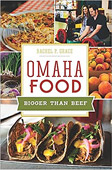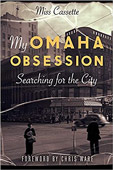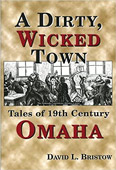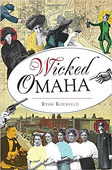I'm a member of the Amazon Associate Program, and like a salesman, I earn a small commission when people follow my links and make purchases.
 Unique Eats and Eateries of Omaha
Unique Eats and Eateries of Omaha
“This book is a must-have to add to your Nebraska or Omaha memorabilia collection. It's also an essential guidebook for anyone new to the area.” - lillepunkin.com
“I appreciated how it rounded out so many flavors of Omaha and captured nostalgia well for places that won’t be around forever- it’s perfect for this time period and represents us well!!” - Reader review
‘Unique Eats and Eateries of Omaha’ highlights nearly 100 local restaurants, some of which have been serving up metro diners for decades.” - James Wilcox, ketv.com
 Lost Restaurants of Omaha
Lost Restaurants of Omaha
Omaha is known for its beef, but the history of its most famous restaurants goes far beyond. The French Café was the place to go to celebrate. Piccolo Pete's, Mister C's and Bohemian Café helped shape neighborhoods in Little Italy, North Omaha and Little Bohemia.
The tales of restaurateurs like the tragic Tolf Hanson; the ever-optimistic Ross Lorello; Anthony Oddo, once a resident at Boys Town; and Giuseppa Marcuzzo, a former bootlegger, also tell the story of the city.
Restaurants played a prominent role as history unfolded in Omaha during prohibition, wartime rations, the fight for equal rights and westward expansion. Author Kim Reiner details the fascinating history behind Omaha's classic eateries.
 Omaha Food: Bigger than Beef
Omaha Food: Bigger than Beef
Without its once-booming livestock industry, Omaha would be a very different place. Although it was originally known for its legendary steakhouses, today's eateries exceed the influence of cattle. Out of a rich foundation of traditions like steaks with hash browns and mostaccioli, Reubens and South O dive bars grew a creative culinary community with a fiercely loyal following.
Today, Omaha is a platform for nationally recognized chefs. Home to one of America's greenest restaurants and the recent birthplace of the Rounder, the story of Omaha food is ripe for the telling. Author Rachel P. Grace celebrates the scene in this unapologetically witty culinary adventure.
 My Omaha Obsession: Searching for the City
My Omaha Obsession: Searching for the City
My Omaha Obsession takes the reader on an idiosyncratic tour through some of Omaha’s neighborhoods, buildings, architecture, and people, celebrating the city’s unusual history. Rather than covering the city’s best-known sites, Miss Cassette is irresistibly drawn to strange little buildings and glorious large homes that don’t exist anymore as well as to stories of Harkert’s Holsum Hamburgers and the Twenties Club.
Piecing together the records of buildings and homes and everything interesting that came after, Miss Cassette shares her observations of the property and its significance to Omaha. She scrutinizes land deeds, insurance maps, tax records, and old newspaper articles to uncover a property’s singular story. Through conversations with fellow detectives and history enthusiasts, she guides readers along her path of hunches, personal interests, mishaps, and more.
 A Dirty, Wicked Town: Tales of 19th Century Omaha
A Dirty, Wicked Town: Tales of 19th Century Omaha
Most folks consider Omaha, Nebraska, a quiet, laid-back city in America's heartland. It wasn't always that way. In the nineteenth century, the town had a different sort of reputation. David L. Bristow tells the story of "the other Omaha."
But scores of settlers, bullwhackers, gamblers, politicians, prostitutes and confidence men saw the future in it. Omaha, grew from a speculative scheme in 1854 to a booming city by the turn of the century. Along the way, there were scores of great stories, many of which Bristow includes in "A Dirty, Wicked Town". All the stories are true - they only read like fiction.
 Wicked Omaha
Wicked Omaha
In old Omaha, the scent of opium wafted through saloon doors, while prostitutes openly solicited customers. When the St. Elmo theater ran short of the usual entertainment, the residents could always fall back on robbing strangers. Tenants of the Burnt District squirmed under the extorting thumb of a furniture dealer dubbed the Man-Landlady. The games of chance and confidence and outright municipal graft all played a part in a wicked city where gambler Tom Dennison ran politics and Madam Anna Wilson drove philanthropy.
Join Ryan Roenfeld for a stroll along the seamier side of Omaha's past.
